
William Erwin Eisner was an American cartoonist, writer, and entrepreneur. He was one of the earliest cartoonists to work in the American comic book industry, and his series The Spirit (1940–1952) was noted for its experiments in content and form. In 1978, he popularized the term "graphic novel" with the publication of his book A Contract with God. He was an early contributor to formal comics studies with his book Comics and Sequential Art (1985). The Eisner Award was named in his honor and is given to recognize achievements each year in the comics medium; he was one of the three inaugural inductees to the Will Eisner Comic Book Hall of Fame.
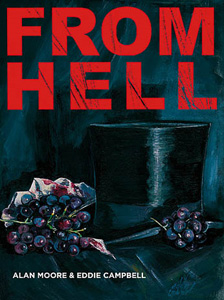
From Hell is a graphic novel by writer Alan Moore and artist Eddie Campbell, originally published in serial form from 1989 to 1998. The full collection was published in 1999 by Top Shelf Productions.

Eddie Campbell is a British comics artist and cartoonist. He was the illustrator and publisher of From Hell, and the creator of the semi-autobiographical Alec stories collected in Alec: The Years Have Pants, and Bacchus, a wry adventure series about the few Greek gods who have survived to the present day.

Scott McCloud is an American cartoonist and comics theorist. He is best known for his non-fiction books about comics: Understanding Comics (1993), Reinventing Comics (2000), and Making Comics (2006), all of which also use the medium of comics.

The Spirit is a fictional masked crimefighter appearing in American comic books. Created by cartoonist Will Eisner, he first appeared as the main feature of a tabloid-sized comic book insert distributed in the Sunday edition of Register and Tribune Syndicate newspapers. Popularly referred to as "The Spirit Section", the insert ran from June 2, 1940 to October 5, 1952.

"Omaha" the Cat Dancer is an erotic comic strip and later comic book created by artist Reed Waller and writer Kate Worley. Set in fictional Mipple City, Minnesota in a universe populated by anthropomorphic animal characters, the strip is a soap opera focusing on Omaha, a feline exotic dancer, and her lover, Chuck, the son of a business tycoon.

Kitchen Sink Press was a comic book publishing company founded by Denis Kitchen in 1970. Kitchen Sink Press was a pioneering publisher of underground comics, and was also responsible for numerous republications of classic comic strips in hardcover and softcover volumes. One of their best-known products was the first full reprint of Will Eisner's The Spirit—first in magazine format, then in standard comic book format. The company closed in 1999.
Warren Publishing was an American magazine company founded by James Warren, who published his first magazines in 1957 and continued in the business for decades. Magazines published by Warren include After Hours, Creepy, Eerie, Famous Monsters of Filmland, Help!, and Vampirella.

A Contract with God and Other Tenement Stories is a graphic novel by American cartoonist Will Eisner published in 1978. The book's short story cycle revolves around poor Jewish characters who live in a tenement in New York City. Eisner produced two sequels set in the same tenement: A Life Force in 1988, and Dropsie Avenue in 1995. Though the term "graphic novel" did not originate with Eisner, the book is credited with popularizing its use.

The Crow is a supernatural superhero comic book series created by James O'Barr revolving around the titular character of the same name. The series, which was originally created by O'Barr as a means of dealing with the death of his fiancée at the hands of a drunk driver, was first published by Caliber Comics in 1989. It became an underground success and was later adapted into a film of the same name in 1994. It was followed by four films, a television series, and numerous books and comic books have also been subsequently produced.

Cages is a ten-issue comic book limited series by Dave McKean. It was published between 1990 and 1996, and later collected as a single volume.

Denis Kitchen is an American underground cartoonist, publisher, author, agent, and the founder of the Comic Book Legal Defense Fund.
Notable events of 1988 in comics.
James Vance was an American comic book writer, author and playwright, best known for his work from Kitchen Sink Press and in particular the lauded Kings in Disguise.

Life On Another Planet, also known as Signal from Space, is a science fiction graphic novel by Will Eisner dealing with the social and political consequences of a first contact with an extraterrestrial civilization. It was first serialized in The Spirit and later collected into a single volume.
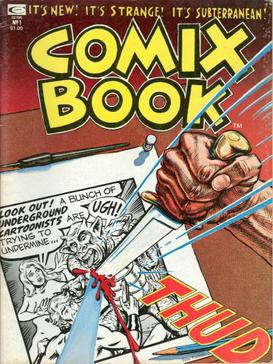
Comix Book is an underground comic book series published from 1974 to 1976, originally by Marvel Comics. It was the first comic of this type to be published by a mainstream publisher. Edited by Denis Kitchen, Comix Book featured work by such underground luminaries as Justin Green, Kim Deitch, Trina Robbins, Art Spiegelman, and S. Clay Wilson. While it did not depict the explicit content that was often featured in underground comix, it was more socially relevant than anything Marvel had previously published.
Dan E. Burr is an American comic book artist best known for his collaborations with writer James Vance on Kings in Disguise and On the Ropes, both set during the Great Depression. He is known for the meticulous research that goes into his artwork.
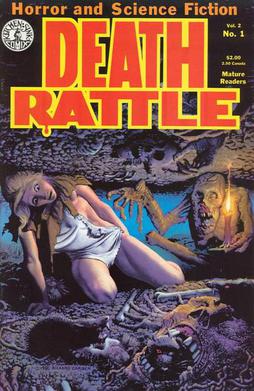
Death Rattle was an American black-and-white horror anthology comic book series published in three volumes by Kitchen Sink Press in the 1970s, 1980s, and 1990s. Death Rattle is not related to the Australian one-shot comic Death Rattle, published by Gredown in c. 1983.
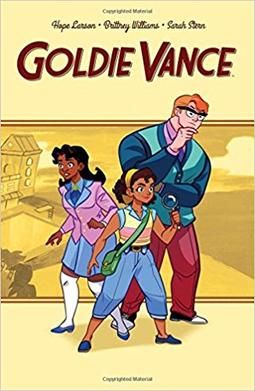
Goldie Vance is a comic book series created by Eisner award winning writer Hope Larson and artist Brittney Williams. It was a monthly ongoing series from 2016 to 2017, then switched to a series of original graphic novels in 2018. In 2019, the comic's publisher, Boom! Studios, partnered with Little, Brown Books to continue Goldie Vance as a series of novels for young readers. The series centers on Marigold "Goldie" Vance, the sixteen-year-old daughter of the manager of a Miami resort, whose dream is to become the resort's in-house detective.
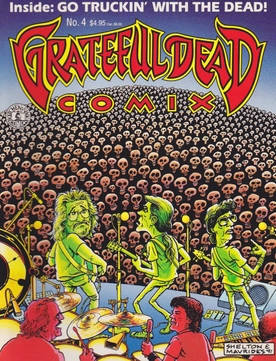
Grateful Dead Comix was a comic book title published by Kitchen Sink Press in the 1990s. The comics included lyrics from Grateful Dead songs adapted into stories, as well as material about the band itself. A total of 9 issues were published from 1991 to 1994.
















